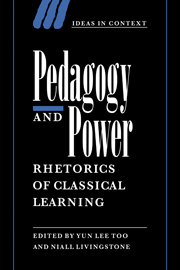Book contents
- Frontmatter
- Contents
- Notes on contributors
- Acknowledgements
- Introduction
- 1 Classics: from discipline in crisis to (multi-)cultural capital
- 2 Schoolboys and gentlemen: classical pedagogy and authority in the English public school
- 3 ‘Die Zung’ ist dieses Schwert': classical tongues and gendered curricula in German schooling to 1908
- 4 ‘What does that argue for us?’: the politics of teaching and political education in late eighteenth-century dialogues
- 5 Women and classical education in the early modern period
- 6 Pilgrimage to Parnassus: local intellectual traditions, humanist education and the cultural geography of sixteenth-century England
- 7 ‘Not so much praise as precept’: Erasmus, panegyric, and the Renaissance art of teaching princes
- 8 Teachers, pupils and imperial power in eleventh-century Byzantium
- 9 Reading power in Roman Greece: the paideia of Dio Chrysostom
- 10 Children, animals, slaves and grammar
- 11 A good man skilled in politics: Quintilian's political theory
- 12 The voice of Isocrates and the dissemination of cultural power
- 13 Xenophon's Cyropaedia: disfiguring the pedagogical state
- Select bibliography
- Index
- IDEAS IN CONTEXT
9 - Reading power in Roman Greece: the paideia of Dio Chrysostom
Published online by Cambridge University Press: 30 September 2009
- Frontmatter
- Contents
- Notes on contributors
- Acknowledgements
- Introduction
- 1 Classics: from discipline in crisis to (multi-)cultural capital
- 2 Schoolboys and gentlemen: classical pedagogy and authority in the English public school
- 3 ‘Die Zung’ ist dieses Schwert': classical tongues and gendered curricula in German schooling to 1908
- 4 ‘What does that argue for us?’: the politics of teaching and political education in late eighteenth-century dialogues
- 5 Women and classical education in the early modern period
- 6 Pilgrimage to Parnassus: local intellectual traditions, humanist education and the cultural geography of sixteenth-century England
- 7 ‘Not so much praise as precept’: Erasmus, panegyric, and the Renaissance art of teaching princes
- 8 Teachers, pupils and imperial power in eleventh-century Byzantium
- 9 Reading power in Roman Greece: the paideia of Dio Chrysostom
- 10 Children, animals, slaves and grammar
- 11 A good man skilled in politics: Quintilian's political theory
- 12 The voice of Isocrates and the dissemination of cultural power
- 13 Xenophon's Cyropaedia: disfiguring the pedagogical state
- Select bibliography
- Index
- IDEAS IN CONTEXT
Summary
Marrou's Histoire de l'éducation dans l'antiquité, still generally cited as the standard account of ancient pedagogy, omits any specific discussion of the values and functions of education in the Greek world under Roman occupation. This silence is perhaps not at first sight surprising: the nineteenth century and its heirs, while embracing Classical Greek culture wholeheartedly, have been notoriously harsh upon later Greek literature. Yet surprise it should, for if it is at all possible to quantify such things, the period of Greek history spanning the early centuries of the Roman empire (often known as the ‘Second Sophistic’) invested more than any other in education. Or, rather, in paideia, the Greek term which carries an altogether different range of meanings both sociological and semantic from the English ‘education.’
To possess paideia – that is, to be pepaideumenos – meant to be familiar with a set of canonical texts, mostly in prose, predominantly from the fifth and fourth centuries bce. It often meant to be able to write or declaim in the archaising Attic dialect in which those texts were written. At a semiotic level, it meant to be Greek, and to be a man. Recent studies have emphasised the distinctive importance of paideia for Greek cultural identity (among the élite, at any rate) and for ideals of manhood (public contests of paideia were represented as trials of virility). In certain circumstances, Greek paideia could even allow non-Greeks a (not uncontested) claim to Greek identity.
- Type
- Chapter
- Information
- Pedagogy and PowerRhetorics of Classical Learning, pp. 192 - 213Publisher: Cambridge University PressPrint publication year: 1998
- 18
- Cited by

